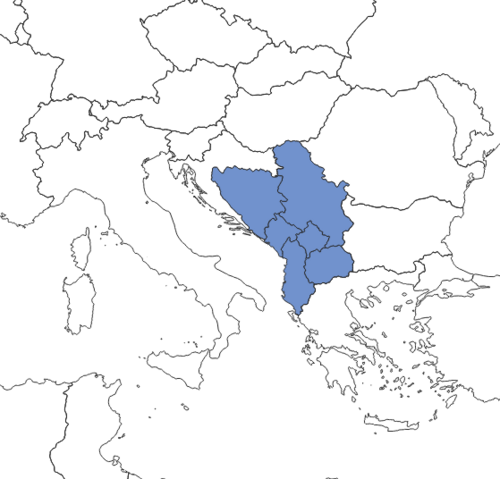Western Balkan Soil Partnership (WBSP)

Official Website
https://seerural.org/category/soil-partnership/
Governance
The Western Balkans Soil Partnership (WBSP) is governed by the WBSP Steering Committee (WBSP SC), which comprises representatives of the WBSP members, from each of the country/territory (member of the Regional Expert Advisory Working Group on soil) which are based on proposals by the ministerial partners. The WBSP SC has a mandate to develop and decide on the organisational structure and statutes of the WBSP, the work programme thereof, as well as to harmonise WBSP activities with the activities of the European Soil Partnership, and of other similar organisations. WBSP will also have an Advisory Board with five members with a function to advise WBSP SC on issues related to governance and other strategic activities.
A chair will be appointed by WBSP SC members.
A Secretariat of the WBSP will be established with the following roles:
- Communication management of members and interested partners
- Information collection and operation and updating of a web site
- Organization of meetings
- Overview of projects
- Monitoring and reporting
SWG RRD as an organization will embed the Secretariat within its structures in its headquarters in Skopje, North Macedonia.
Regular meetings of the steering and implementation body as well as other interested members and partners will collect experiences from implementation, and also discuss needs and requirements expressed by stakeholders. There is no fixed meeting schedule.
Contact
The Standing Working Group for Regional Rural Development (SWG RRD) is coordinating all activities.
Contact person for all inquiries regarding Western Balkans Soil Partnership:
Mr. Boban Ilic, Secretary General
Head Office/Secretariat of the SWG
E-Mail: swgsecretariat@swg-seerural.org
Countries
Albania, Bosnia and Herzegovina, Kosovo, Montenegro, Republic of North Macedonia, Serbia
History
Under the Green Agenda for the Western Balkans, the creation of a sub-regional soil partnership was foreseen. Mediated by the project “Agriculture Policy Dialog Germany – Western Balkan”, that had been established under the Standing Working Group in South-Eastern Europe (SWG), a Regional Expert Advisory Working Group on Soil Management (REAWG) was set in place. The REAWG then prepared background papers, the communiqué and a roadmap for the creation of the Western Balkan Soil Partnership.
In November 2022 the Ministers of Agriculture from South Eastern Europe (SEE) and Heads of Delegation came together in Budva, Montenegro for the 16th Annual Working Meeting. During this meeting they signed the Communiqué/Memorandum of Understanding on the Soil Partnership of the Western Balkans.
Guiding principles
Guiding principles for this partnership are received from the following initiatives:
- the ‘Green Agenda for Western Balkans’ (GAWB), building on the Sofia Declaration 2020, and the Action plan for the implementation of the GAWB Brdo pri Kranju 2021, addressing the challenges to safeguard healthy soils for the Balkan region
- the UN Sustainable Development Goals (SDGs) tackling land degradation
- the Global Soil Partnership (GSP), its revised World Soil Charter and the Voluntary Guidelines for Sustainable Soil Management
More information on the Meeting of the REAWG and the activities of the WBSP can be found on the official website. View all publications of the Standing Working Group (SWG) here.
- Preparation of evidence-based policy documents (strategic papers with proposed policy measures for the climate change adaptation in agriculture, together with Action plans) and soil map of the Western Balkan
- 03/2024: Seventh Meeting of the REAWG
- 06/2024: Eighth Meeting of the REAWG
- 10/2024: Ninth Meeting of the REAWG
- Focus on Soil Pollution: Summarization of existing knowledge, overview of regional thresholds for contaminants, collection of available information on contaminated sites in the region, accessment of a legal framework for the management of contaminated sites
- Publication: The State of the Soil Pollution in the Western Balkans
- Development of project proposal to create a regional soil database for soil health assessments
- 03/2023: Fourth Meeting of the REAWG
- 06/2023: Fifth Meeting of the REAWG
- 10/2023: Sixth Meeting of the REAWG
- Production of a synthesis about national soil classification systems in the region
- 03/2022: First Meeting of the Regional Expert Advisory Working Group (REAWG): Discussion of the establishment of the Regional Soil Partnership
- 06/2022: Second Meeting of the REAWG
- 10/2022: Third Meeting of the REAWG
- 11/2022: Establishment of the Western Balkan Soil Partnership (WBSP) in Budva, Montenegro
- Publication: Soil Management in the Western Balkans - Gaps and Recommendations
- 11/2021: Kick-Off Meeting Regional Expert Advisory Working Group (REAWG) on Soil Management (within the "Agriculture Policy Diaglog Germany -Western Balkan" project)
- Publication: State of the Art of Soil Management in the Western Balkans